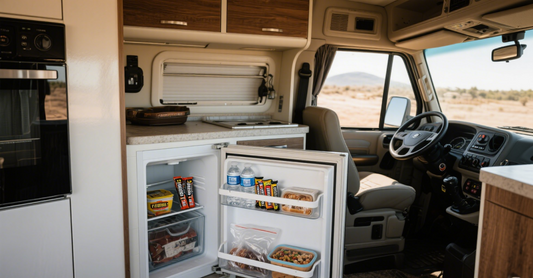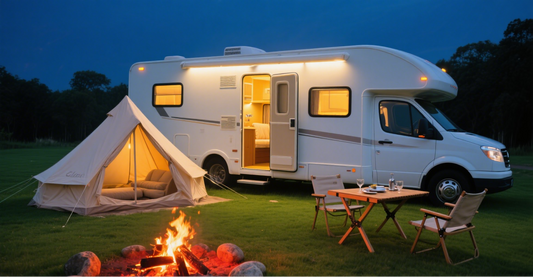How Long Do Lithium RV Batteries Last
Reliable power is essential for RV camping, whether you're exploring off-grid in a Class A motorhome or enjoying a weekend getaway in a travel trailer.
Camping in the wild requires reliable batteries, and RV lithium batteries are the best choice due to their long lifespan, low maintenance, and ability to continuously power high-drain devices.
This article explores the lifespan of RV lithium batteries and provides practical tips for maximizing the lifespan of RV, fifth-wheel, and truck camper lithium batteries.


What Types of RV Batteries Are There?
Selecting the right battery for your RV, whether a Class A, B, C motorhome battery, 5th wheel battery, or modified vehicles battery, requires understanding lead-acid (flooded), absorbed glass mat (AGM), and lithium iron phosphate (LiFePO4) batteries.
Each type varies in lifespan, maintenance, and suitability for RV camping.
- Lead-acid batteries are budget-friendly, lasting 3-5 years with 500-1,000 charge-discharge cycles, but require regular maintenance (e.g., checking electrolyte levels, adding distilled water) and cannot be discharged beyond 50% without damage.
- AGM batteries, a lead-acid variant, last 5-7 years with 1,000-2,000 cycles and need less maintenance, but are sensitive to overcharging.
- Lithium RV batteries offer 5-15 years of service, 2,000-5,000 cycles, and no maintenance, making them ideal for boondocking and modified vehicles like van conversions due to their compact size and flexible installation.
The table below outlines the key differences between different types of RV batteries, comparing them to make RV lithium batteries the best lithium battery choice for Class A motorhome batteries and truck camper batteries:
| Battery Type | Lifespan | Cycle Life | Maintenance | Weight | Best Use |
|---|---|---|---|---|---|
| Lead-Acid | 3-5 years | 500-1,000 | High (electrolyte checks, water refills) | Heavy (50-100 lbs) | Budget-conscious, occasional camping |
| AGM | 5-7 years | 1,000-2,000 | Low (monitor charging) | Moderate (40-80 lbs) | Moderate use, less maintenance |
| Lithium (LiFePO4) | 5-15 years | 2,000-5,000 | None (BMS-protected) | Light (20-30 lbs for 100Ah) | Boondocking, full-time RVing |
Cycle Life of Lithium RV Batteries
Cycle life, the number of times a battery can be charged and discharged before losing capacity, determines its longevity.
Think of cycles like filling and emptying a water bottle, a full cycle is charging from 0% to 100% and back, but most RVers use partial cycles (e.g., discharging to 20% and recharging to 80%), which cause less wear.
Lithium RV batteries typically offer 2,000-5,000 cycles at 80% depth of discharge (DoD), compared to 500-1,000 for lead-acid.
For example, a Temgo Class C RV battery with a cycle count of 4,000 can last 5-10 years if it is used once a day.
2,000-5,000 times is the standard cycle life for LiFePO4 batteries, ensuring reliable battery power for travel trailer and fifth wheel battery applications.
Factors Affecting Lithium RV Battery Lifespan
Several factors influence the lifespan of lithium RV batteries, including charging practices, maintenance, usage patterns, and environmental conditions. These tips help maximize performance for Class A battery, Class B battery, and truck camper lithium batteries.
Charging Practices
- According to Pickett's law, RV lithium batteries maintain a constant voltage throughout their discharge range, unlike lead-acid batteries, which decrease in voltage as they discharge.
- Charging to 80% reduces cycle count and speeds up charging, extending lifespan.
- A Battery Management System (BMS) is an internal safety feature of lithium-ion batteries that effectively prevents common problems such as overcharging and undercharging, ensuring the reliability of RV batteries.
- Use a LiFePO4-compatible smart charger, like Temgo's 14.6V 50A model, which charges a 200Ah battery in 4-5 hours under optimal conditions (e.g., full charger efficiency, no power loss).
- Avoid lead-acid chargers, as they may overcharge and trigger BMS shutdowns.
Usage Patterns
Full-time RVers with a Class A motorhome battery may cycle daily, while seasonal campers with truck camper lithium batteries use fewer cycles annually.
Lithium's low self-discharge rate (2-3% per month vs. 33% for lead-acid) preserves charge during storage.
Environmental Conditions
Lithium RV batteries perform best at 50-80°F (10-24°C) with 30-50% humidity. High temperatures above 140°F (60°C) can degrade performance, so ensure ventilation during summer camping.
If you use self-heating lithium RV batteries, like Temgo 12V 100Ah self-heating model, use an internal heating pad powered by an external source (e.g., solar, alternator) to warm to 41°F (5°C) when charging below 32°F (0°C), ideal for winter camping with truck camper lithium batteries.
Note that self-heating doesn't activate during discharge, so avoid deep discharges in extreme cold.
Maintenance
Lithium RV batteries are maintenance-free, unlike lead-acid batteries, which require water checks and corrosion cleaning. This eliminates lifespan reduction from improper care, making lithium ideal for batteries for travel trailers and 5th wheel battery users seeking hassle-free operation.
Lithium RV Batteries Use Safety and Installation Considerations
After purchasing a lithium-ion RV battery, ensuring battery safety during use is crucial.
Select a lithium-ion battery with a battery management system (BMS) to protect against overcharging, overheating, and short circuits. Lead-acid batteries can also pose a risk of acid or gas leaks.
If you're looking for a high-performance RV battery, Temgo 12V RV batteries all feature built-in BMS safety protection and Bluetooth monitoring, which sends real-time safety alerts via the Temgo app.
Safety Features and Precautions
Lithium RV batteries are designed with a built-in Battery Management System (BMS), a critical safety feature that monitors voltage, current, and temperature to prevent overcharging, over-discharging, overheating, and short circuits. When using, please be sure to follow the following practices:
- Handle with Care: Use insulated gloves when installing or inspecting lithium RV batteries to avoid accidental shorts, especially in tight spaces like truck camper lithium batteries or van conversion setups. Physical damage (e.g., punctures) can compromise the BMS and lead to malfunction.
- Avoid Extreme Conditions: Do not expose batteries to temperatures above 140°F (60°C) or below -4°F (20°C) during operation, as extreme conditions can reduce lifespan or trigger BMS shutdowns.
- Safe Storage: Store batteries for travel trailers or 5th wheel battery units in a dry, ventilated compartment to prevent moisture buildup, which can damage connections. Charge to 50-0% before long-term storage to minimize self-discharge and maintain battery health.
- Recycling and Disposal: Lithium RV batteries are 95% recyclable, reducing environmental impact compared to lead-acid batteries, which contain hazardous lead and sulfuric acid. Follow local regulations or contact manufacturers like Temgo for recycling programs to ensure safe disposal.
Installation Best Practices
Proper installation of lithium RV batteries ensures compatibility, efficiency, and safety across RV types, from Class C battery systems to truck camper lithium batteries. Follow these steps to install batteries correctly:
- Check Compatibility
Verify that your RV's wiring, inverter, and charger are compatible with LiFePO4 batteries.
Class A motorhome battery setups often use 12V or 24V systems, while modified vehicles battery applications (e.g., van conversions) may require custom configurations.
Use a LiFePO4-compatible smart charger and an MPPT solar charge controller for efficient charging, especially for batteries for travel trailers paired with solar panels.
- Secure Mounting
Mount batteries in a sturdy, ventilated tray to prevent movement during travel, which is critical for truck camper lithium batteries in rugged conditions. For instance, Temgo's 12V 100Ah battery (10.24 x 6.61 x 8.23 inches) fits compact spaces in Class B battery or van conversion setups. Use non-conductive brackets to avoid short circuits.
- Ensure Proper Ventilation
Although lithium RV batteries produce no gases (unlike lead-acid), ventilation prevents heat buildup. Install in a compartment with airflow, especially for Class A motorhome battery systems with multiple batteries, to maintain optimal temperatures 50-80°F.
- Connect Correctly
Use appropriately rated cables (e.g., 4 AWG for high-current applications) and ensure tight, corrosion-free connections. For 5th wheel battery or Class C battery setups, connect batteries in parallel or series as needed, following manufacturer guidelines to avoid BMS errors.
- Solar Integration
For off-grid camping, pair lithium RV batteries with a solar system. A 200W solar panel with an MPPT controller can recharge a 100Ah battery in 6-8 hours of sunlight, ideal for batteries for travel trailers or truck camper lithium batteries. Confirm the controller's LiFePO4 settings to optimize charging efficiency.
Additional Considerations
- Fuse Protection: Install an appropriately rated fuse (e.g., 200A for a 100Ah battery) between the battery and RV system to protect against short circuits, especially in modified vehicles battery setups with complex wiring.
- Regular Inspections: Check connections monthly for signs of wear or loosening, particularly for Class B battery or truck camper lithium batteries exposed to vibration. Use the Temgo app's Bluetooth monitoring to track performance metrics like voltage and temperature.
- Professional Assistance: For complex installations, such as integrating multiple Class A motorhome battery units or retrofitting a van conversion, consult a professional to ensure compliance with RV electrical standards.
By following these safety and installation practices, lithium RV batteries provide reliable, safe power for all RV types, from Class C battery systems to batteries for travel trailers, enhancing your camping experience with minimal risk.
Are Lithium RV Batteries Worth the Investment?
While lithium-ion batteries for RVs have a higher upfront cost, they offer the best long-term savings.
A Temgo 12V 300Ah battery lasts 5-10 years. While a $200 lead-acid battery needs to be replaced every 2-3 years, costing $600-1,000 over 10 years, lithium-ion batteries last the entire lifespan. Because lithium-ion batteries require fewer replacements and require no maintenance, their lifetime costs can be 2-5 times lower.
Benefits include
- Lightweight Design: At 23-30 lbs for 100Ah, lithium batteries save fuel.
- Fast Charging: A 5-hour charge minimizes downtime for 5th wheel battery users.
- High Discharge Capacity: Supports 80-100% DoD, continues to power appliances like refrigerators in batteries for travel trailers.
Practical Tips for Using Lithium RV Batteries
Maximizing the performance and lifespan of lithium RV batteries requires tailored strategies for various RV lifestyles, whether you're boondocking with a Class A motorhome battery, enjoying weekend trips with batteries for travel trailers, or powering a van conversion with a modified vehicles battery.
These tips will ensure reliable power for off-grid camping, seasonal use, or all-weather RV travel. Below, we'll provide detailed guidance to optimize your battery usage.
For Wild Camping: Providing Power for Off-Grid Adventures
Lithium RV batteries excel in boondocking camping without electrical hookups due to their high discharge capacity (80-100% depth of discharge).
To estimate power needs, use this formula: multiply appliance watts by hours of use, then divide by battery voltage (e.g., 500W fridge x 5 hours = 2,500Wh ÷ 12.8V = ~195Ah).
Select a battery with 20% extra capacity to avoid deep discharges. Pair with a 300W solar panel and LiFePO4-compatible MPPT controller to recharge in 5-7 hours of sunlight, ensuring uninterrupted power for truck camper lithium batteries during extended trips.
Proper RV Battery Storage: Keeping Your Batteries Healthy
Charge lithium RV batteries to 50-60% before storing to minimize self-discharge (2-3% monthly vs. 33% for lead-acid).
Store in a dry, ventilated compartment at 50-80°F (10-24°C) to avoid temperature stress. Avoid full charges (100%) during storage, as this can accelerate cell aging. For batteries for travel trailers, use a battery disconnect switch to prevent parasitic drain from RV electronics.
Monitoring: Real-Time Performance Tracking
Choosing bluetooth-enabled lithium RV batteries, like Temgo 12V 300Ah model with an LCD screen and app, allow real-time monitoring of voltage, current, cycle count, and temperature.
This is particularly useful for Class A motorhome battery or modified vehicles battery users managing complex setups. Real-time monitoring extends lifespan by avoiding over-discharge.
Reducing Parasitic Loads: Minimizing Unnecessary Drain
Parasitic loads from RV appliances (e.g., clocks, sensors) can drain lithium RV batteries when idle.
Install a battery disconnect switch to cut power to non-essential circuits, extending lifespan for batteries for travel trailers or 5th wheel battery setups. For example, a 100Ah Class B battery can lose 1-2Ah daily to parasitic loads without a switch, reducing available capacity over time.
Check wiring for faults, as loose connections can increase drain, particularly in modified vehicles battery systems like van conversions with custom electronics.
Winter Camping: Leveraging Self-Heating Technology
These batteries use an internal heating pad, powered by an external source (e.g., solar panel, alternator), to warm to 41°F when charging below 32°F, ideal for truck camper lithium batteries or Class B battery users.
For example, a self-heating battery maintains full charging efficiency during a 20°F camping trip, unlike lead-acid batteries, which lose capacity below freezing.
Avoid deep discharges in extreme cold without self-heating, as this can trigger BMS protection.
Solar Integration: Sustainable Power for Off-Grid Camping
Pairing lithium RV batteries with solar panels enhances off-grid capability, especially for batteries for travel trailers or Class A motorhome battery systems. A 200W solar panel with a LiFePO4-compatible MPPT controller recharges a 100Ah battery in 6-8 hours of sunlight (assuming 25A output).
Ensure the controller has LiFePO4 settings to prevent overcharging, and clean panels regularly to maintain efficiency, per industry recommendations.
Appliance Compatibility: Matching Power Needs
Match your lithium RV batteries to appliance demands for optimal performance. For example, a 1,500W microwave requires a 2,000W inverter and a 200Ah 5th wheel battery to run for 1 hour (1,500Wh ÷ 12.8V = ~117Ah). A Temgo 12V 200Ah battery supports this with capacity to spare, ideal for Class A battery or modified vehicles battery setups.
Create a power budget: list appliances, their wattage, and daily usage (e.g., LED lights: 10W x 5 hours = 50Wh). Sum the total watt-hours and divide by 12.8V to determine required Ah, ensuring your battery meets truck camper lithium batteries needs.
If you're not sure, we can also use our RV battery calculator tool to create a plan tailored to you.
Checklist for Optimizing Lithium RV Battery Performance
- Use a LiFePO4-compatible charger or MPPT solar controller.
- Store at 50-60% charge in a ventilated, 50-80°F compartment.
- Install a disconnect switch to eliminate parasitic loads.
- Monitor via Bluetooth app to track voltage and cycles.
- Use self-heating lithium RV batteries for winter camping.
- Calculate appliance power needs to select the right battery capacity.
- Inspect connections monthly for wear.
Conclusion
Lithium RV batteries deliver 5-15 years of reliable power with 2,000-5,000 cycles, no maintenance, and high discharge capacity, making them ideal for Class A, B, C battery and truck camper lithium batteries applications.
Compared to lead-acid (3-5 years) and AGM (5-7 years), lithium batteries excel in longevity, efficiency, and ease of use, particularly for boondocking and full-time RVing. Their low self-discharge, fast charging, and self-heating technology ensure consistent performance across RV lifestyles.
For dependable power, Temgo batteries offer advanced LiFePO4 technology with 4,000+ cycles, self-heating for winter camping, and Bluetooth monitoring via a friendly app.
With a 5-year warranty and models from 12V 100Ah to 460Ah, Temgo ensures reliable, lightweight power for Class A motorhome battery or travel trailer setups. Explore the Temgo lithium RV batteries today to power your RV adventures.


